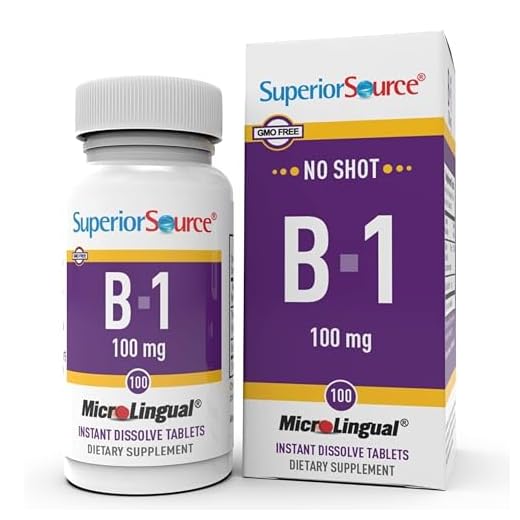







Vitamin B1, or thiamine, supports your metabolic health by converting carbohydrates into glucose, which your body uses for energy. It acts as a cofactor in key metabolic pathways, including the glycolytic pathway and Krebs cycle, helping create ATP efficiently. Thiamine is essential for metabolizing pyruvate and fatty acids, preventing issues like fatigue and muscle weakness linked to deficiency. Additionally, it may improve metabolic control in conditions like diabetes. Ensuring adequate thiamine intake—through diet or supplementation—can enhance your energy levels and overall health. There's much more to explore about thiamine's benefits and its significance in daily nutrition.
Key Takeaways
- Vitamin B1 (thiamine) is essential for converting carbohydrates into glucose, fueling energy production.
- It acts as a cofactor in key metabolic pathways, including glycolysis and the Krebs cycle.
- Thiamine supports the metabolism of lactate and pyruvate, preventing lactic acidosis and enhancing ATP synthesis.
- Supplementation may improve glucose metabolism and insulin sensitivity, particularly in individuals with diabetes.
- Adequate thiamine levels are linked to cardiovascular health by reducing oxidative stress and improving energy metabolism in heart tissue.
Role of Vitamin B1 in Metabolism
Vitamin B1, also known as thiamine, plays an important role in your body's metabolism, particularly in how it converts carbohydrates into glucose for energy. Thiamine acts as a cofactor for key enzymes in the glycolytic pathway and the Krebs cycle, both critical processes that facilitate energy production from carbohydrates, fats, and proteins. By aiding the conversion of pyruvate to acetyl-CoA, thiamine guarantees efficient ATP synthesis, which is necessary for fueling your cells. Additionally, thiamine supports a healthy metabolism and energy levels, making it a valuable addition to your daily supplement routine, such as NOW Vitamin B-1 which offers 100mg per tablet.
A deficiency in thiamine can disrupt this process, leading to lactic acidosis and reduced energy levels. Without adequate thiamine, your metabolism may struggle, impacting your overall metabolic health. This is especially important since thiamine is water-soluble and not stored in your body, meaning you need to regularly include dietary sources rich in thiamine to maintain ideal function. Foods like whole grains, legumes, and nuts serve as excellent sources of this essential nutrient.
Moreover, thiamine supports neuronal metabolism and cognitive function, underscoring its importance in maintaining energy balance in the brain. Making sure you get enough thiamine is important for both metabolic efficiency and mental clarity.
Health Implications of Deficiency
Thiamine deficiency poses essential health risks that can severely impact your metabolic health and overall well-being. Without adequate thiamine, you may experience symptoms like fatigue, irritability, confusion, and muscle weakness, all of which can impair your metabolic function and energy metabolism. Vitamin B1 is vital for ATP production, which is critical for energy generation in your body, and its deficiency can disrupt nerve communication and overall function. One of the most serious conditions associated with thiamine deficiency is beriberi, which can lead to nerve damage and cardiovascular issues. Additionally, Wernicke-Korsakoff syndrome may develop, characterized by severe memory problems and neurological damage.
Individuals with alcohol use disorders are particularly vulnerable, with up to 80% facing thiamine deficiency-related health complications due to ethanol's negative effects on absorption and metabolism. When thiamine levels drop considerably, your body may struggle to convert lactate to pyruvate efficiently, resulting in lactic acidosis and further disrupting energy metabolism. This condition underscores the importance of nerve function and energy production in maintaining metabolic health.
To avoid these serious health implications, it's essential to monitor thiamine levels, especially in at-risk populations such as the elderly and those with gastrointestinal diseases. By ensuring adequate thiamine intake, you can help prevent the considerable health complications associated with deficiency and support your overall metabolic health.
Thiamine and Chronic Conditions
Insufficient thiamine levels can have significant implications for individuals with chronic conditions, impacting their overall metabolic health. For instance, in diabetes, thiamine deficiency has been linked to impaired glucose metabolism, and supplementation may help improve blood sugar levels. This is essential for managing diabetes effectively and enhancing metabolic function. Additionally, research indicates that maintaining adequate levels of vitamin B1 can support energy metabolism, which is important for individuals coping with chronic illnesses natural food sources of vitamin B1.
In heart failure patients, thiamine deficiency is especially prevalent. Research demonstrates that thiamine supplementation can improve cardiac function and reduce symptoms of heart disease, making it a critical consideration for those affected.
Moreover, low thiamine levels are associated with cognitive decline and neurodegenerative diseases, such as Alzheimer's. Ensuring adequate thiamine intake can be fundamental for maintaining brain health and potentially preventing these debilitating conditions.
Additionally, individuals with chronic alcoholism are at a heightened risk for thiamine deficiency, which can lead to Wernicke-Korsakoff syndrome. This emphasizes the need for careful monitoring and targeted supplementation in this population to safeguard against severe neurological effects.
Recommended Intake and Sources
Meeting your daily requirements for thiamine is essential for maintaining ideal metabolic health. The recommended intake for adult males is approximately 1.2 mg of vitamin B1, while adult females need about 1.1 mg per day. If you're pregnant or breastfeeding, your daily intake should increase to around 1.4 mg to support both your health and your baby's development.
To meet these requirements, you can focus on dietary sources rich in thiamine. Whole grains, legumes, pork, beef, poultry, and fortified cereals are major contributors, providing over 50% of thiamine intake in the U.S. Incorporating these foods into your meals can help guarantee you're getting enough thiamine to support your metabolic health.
Keep in mind that cooking methods can impact thiamine content. For example, boiling can lead to significant losses due to its water-soluble nature, so consider steaming or roasting when preparing your meals. Infants and children also have varying thiamine needs, requiring 0.2-0.9 mg daily, depending on their age. By paying attention to your thiamine intake, you can effectively support your metabolic health throughout different life stages.
Safety and Supplementation Guidelines
Guaranteeing adequate vitamin B1 intake through diet is important, but some individuals may still need to evaluate supplementation for ideal metabolic health. Vitamin B1, or thiamine, is generally safe for supplementation, as there's no established upper limit; excess amounts are excreted through urine without known toxicity. The Recommended Dietary Allowance (RDA) suggests a daily intake of approximately 1.1 mg for females and 1.2 mg for males, with higher needs for pregnant (1.4 mg) and breastfeeding women.
If you're at risk of thiamine deficiency—like those with alcohol dependence, malabsorption syndromes, or certain medical treatments—you might consider supplementation. Oral doses commonly range from 50 to 100 mg daily, but severe deficiencies may necessitate intravenous administration of 100 mg for several days.
Before starting any thiamine supplements, it's essential to consult with a healthcare provider, especially if you have pre-existing health conditions or are taking medications that could impact thiamine status. This guarantees your supplementation strategy aligns safely with your health needs and supports your metabolic health effectively.
Current Research and Findings
Recent studies underscore the vital role of thiamine (Vitamin B1) in glucose metabolism and its influence on insulin sensitivity, making it a key player in metabolic health. Research indicates that adequate thiamine levels can greatly enhance energy production and metabolic control, particularly for those with type 2 diabetes. Supplementation may lower blood glucose levels, showcasing thiamine's potential as an effective therapeutic intervention.
Moreover, thiamine deficiency can lead to increased lactate and pyruvate levels, resulting in lactic acidosis, which highlights the vitamin's importance in maintaining proper metabolic function. Thiamine also plays a multifaceted role in the metabolism of fatty acids and amino acids, further contributing to overall metabolic health.
Evidence suggests that sufficient thiamine levels correlate with reduced oxidative stress, which can protect against various metabolic disorders. This protective effect extends to cardiovascular health, demonstrating how thiamine supports not just metabolic functions but also heart health. By understanding these findings, you can appreciate how essential Vitamin B1 is for maintaining ideal metabolic health and preventing complications associated with deficiency.
Conclusion
So, who knew a tiny vitamin like B1 could pack such a punch for your metabolism? While you might think you can skip it without consequences, a deficiency could lead to serious health issues. It's ironic that something so small can play such a big role in keeping you energized and healthy. Remember, a balanced diet with enough thiamine isn't just a suggestion; it's essential for your well-being. Don't underestimate the power of B1!





